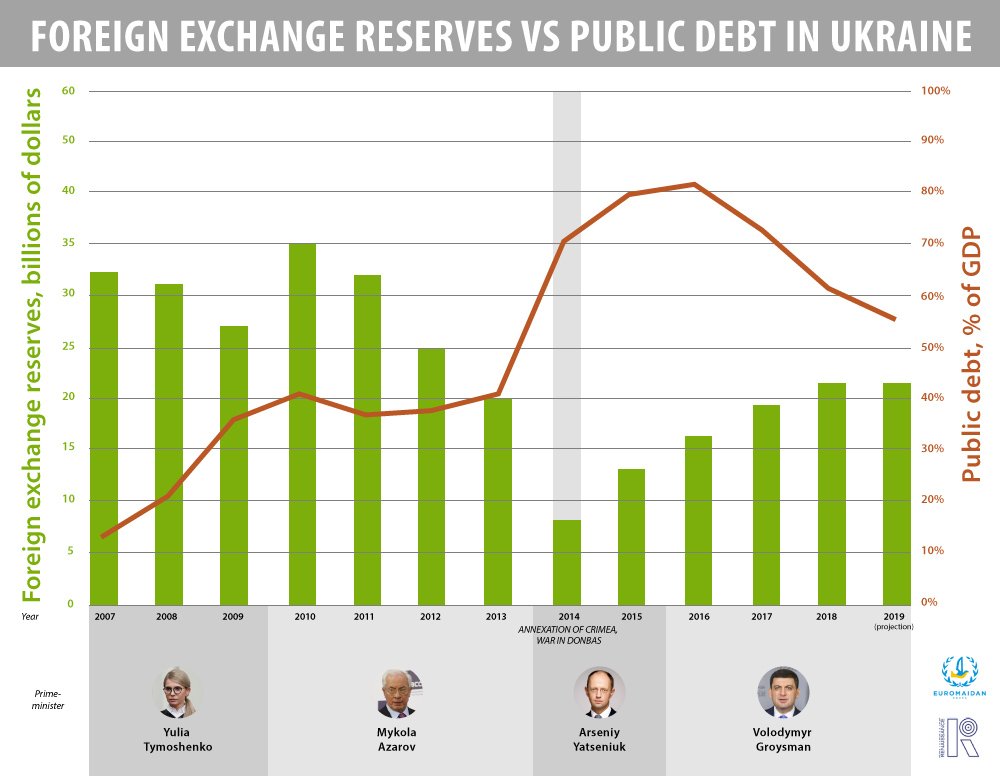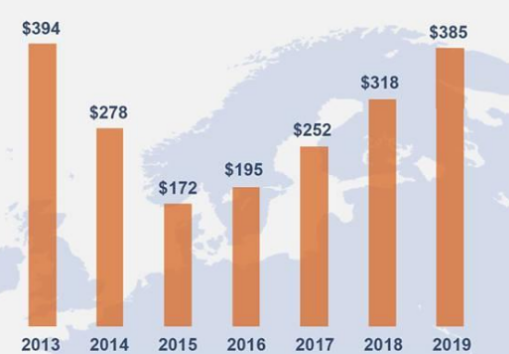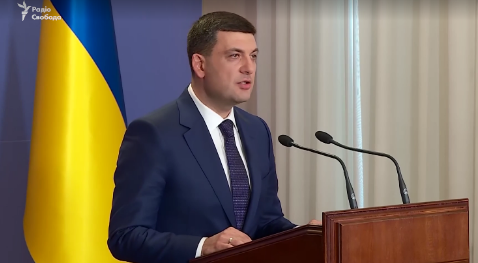Following the election of Volodymyr Zelenskyy, the resignation of the Ukrainian Prime-minister and government, dismissal of the Parliament, as well as uncertainty of new president and his team have swayed the hryvnia’s Forex rate and cheapened Ukrainian Eurobonds up to 1%.
Such events are partially enabled by the successful work of the previous government, which has created a financial cushion that allows the new authorities to spend savings and play populist games with people and IMF, but only for two years.
Yet, it’s feasible that, despite the radical political rhetoric, new authorities will continue previous policies, including the maintenance of macroeconomic stability in cooperation with the IMF.
Uncertain statements regarding the cooperation with the IMF and the need to cooperate
It’s common for all states to have periods of financial accumulations and then generous spendings for various social programs. However, in the case of Ukraine, the country needs at least three more years of strong cooperation with the IMF and strict tariff and social policies, until the economy becomes strong enough. This was openly stated by Satu Kahkonen, World Bank Country Director for Belarus, Moldova, and Ukraine. She also stated that the World Bank would not be able to support Ukraine if Ukraine leaves the program of IMF. At the same time, the statements of the Oleh Ustenko, Advisor of President Volodymyr Zelenskyy on Macroeconomic Policy, have been quite ambiguous. He told that, in the short term, Ukraine will be able to maintain macro-financial stability without the next tranche of the International Monetary Fund, but in the long-term, the country needs to continue cooperation with the IMF, stating that,"To cover repayments of debt bonds, we have reserves of the Single Treasury Account and an ‘airbag’ in the form of more than US$20 billion of foreign exchange reserves.”He also mentioned that certain new programs with the IMF may be started and that
"IMF representatives are in Kyiv, negotiations are underway… Cooperation with the IMF is important, while the Ukrainian economy is quite weak."On the part of the IMF, the planned mission to Ukraine started on 21 May and will continue for two weeks. However, the unexpected resignation of government and dismissal of the Parliament have complicated the work of the mission. Ukraine entered 2019 with a record commitment on external payments of US$6.3 billion. The next tranche already planned for May-June was to soften these payments but the future of this payment remains indefinite, as are the statements of the IMF.
“The mission of the Fund is currently in Kyiv. They hold constructive discussions with the authorities on the latest developments in the situation, as well as on economic policy,” Gerry Rice, director of the IMF press office, told a correspondent of Ukrinform. “As soon as the new government is formed, we are ready to return to the discussion on our further cooperation with Ukraine… We do not comment on political changes in any country, so I will not comment on this in the context of Ukraine."
A legacy from the previous government to be continued and developed further
 While waiting for the results of the ongoing meetings, the reports on the work of the previous government deserve praise, at least in the comparison to the previous Ukrainian governments.
In the latest meeting of the government, the Prime-minister Volodymyr Groysman listed all the main achievements of the last three years. For sure, his was the only Ukrainian government that radically reduced state debt compared to GDP and increased foreign exchange reserves at the same time.
In May this year, state debt was reduced to less than 60% of GDP. In that way, Ukraine returned to the macroeconomic limits required for membership in the European Union. Foreign exchange reserves, equaling US$20 billion are the highest in the last 7 years, which is quite a growth for a country at war.
While waiting for the results of the ongoing meetings, the reports on the work of the previous government deserve praise, at least in the comparison to the previous Ukrainian governments.
In the latest meeting of the government, the Prime-minister Volodymyr Groysman listed all the main achievements of the last three years. For sure, his was the only Ukrainian government that radically reduced state debt compared to GDP and increased foreign exchange reserves at the same time.
In May this year, state debt was reduced to less than 60% of GDP. In that way, Ukraine returned to the macroeconomic limits required for membership in the European Union. Foreign exchange reserves, equaling US$20 billion are the highest in the last 7 years, which is quite a growth for a country at war.


“Presumably, when the President asked the government to resign, he showed that he and his team have another plan how to respond to the future challenges that have not gone away. We have a serious government debt that is not created by us, but we managed to reduce it from 70% of GDP to 60% of GDP. We have a number of other threats in the security sector for restoring our territorial integrity; energy security is disturbing us as well. I think, all these are tasks on the agenda...”
Read also:
- Vitaly Portnikov: The Game of Thrones is just beginning
- Zelenskyy may turn out to be a better Ukrainian president than many expect, Eidman says
- Zelenskyy’s first appointments: Kolomoiskyi’s lawyer, cronies, experts
- Ukrainian Parliament doesn’t support Zelenskyy’s bill to change election system
- Ukrainian civil society outlines “red lines” President Zelenskyy can’t cross

